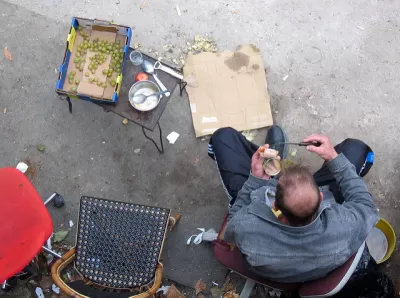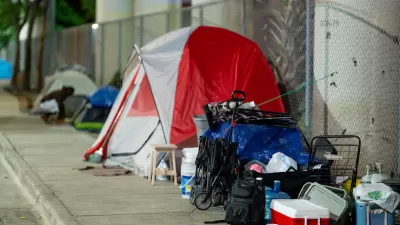If the Supreme Court hears an appeal of a landmark U.S. Ninth Circuit Court case settled in April, the ruling would have widespread implications for dealing with homeless encampments throughout the West, perhaps nowhere more so than Los Angeles.

At least two rulings from the U.S. Ninth Circuit Court of Appeal, the most recent being Martin v. City of Boise on April 1, prohibit cities and counties in nine Western states and two U.S. territories, from enforcing anti-camping laws unless shelter space is available for homeless residents.
"Theodore B. Olson, a conservative legal hero who has argued 63 times before the U.S. Supreme Court, has launched an appeal that could restore L.A.’s authority to clear street encampments at night — and reverse the city’s gradual shift toward decriminalizing homelessness and liberalizing its policies," reports Gale Holland, who covers homelessness and poverty for the Los Angeles Times, on July 2.
Olson's firm, Gibson, Dunn & Crutcher, a powerhouse law firm with offices in L.A., was selected to represent Boise for the appeal process, in part by offering "a flat fee of about $300,000, which is far below the firm’s usual rates," according to Mike Journee, a spokesman for Boise, notes Holland. "The attorneys also demonstrated interest and experience in the subject matter, he said."
Earlier this month, the U.S. Supreme Court granted Olson and fellow attorney Theane Evangelis an extension to ask the justices to take up the case, Martin vs. City of Boise — the first step in an appeal.
The attorneys [...] cited the “urgent crisis and the public health challenge” of burgeoning encampments. They argue the shantytowns trap homeless people in dangerous conditions that keep them from seeking shelter and services.
As posted last September, a three-judge panel for the U.S. Ninth Circuit Court of Appeals ruled that enforcing anti-camping laws when there is no shelter space available, is a violation of the Eighth Amendment to the United States Constitution which prohibits cruel and unusual punishment. On April 1, the court rejected a petition to challenge the September ruling for a rehearing, reported Patrick Sisson for Curbed.
The 2-1 decision [pdf] [sic] by a panel of three judges means that the earlier decision by the court stands, an affirmation of the theory that criminalizing people for camping of sleeping in public without any place to go is illegal.
Cities have already been adjusting their policy based on the September ruling in the case. San Francisco, Portland, and Sacramento have stopped enforcing such rules based on this new precedent.
There were actually two rulings in April 1 on the Martin case, which previously was called Bell vs. City of Boise, filed by the National Law Center on Homelessness & Poverty in 2009 with co-counsel Idaho Legal Aid Services and Latham & Watkins LLP, on behalf of six homeless people in Boise. In addition to the panel voting against a rehearing, "[t]he full court also voted against hearing the case en banc," as Jenna Green reported for ALM Media, and this one included major dissenting opinions.
"Judge Milan Smith Jr. said the opinion broke with precedent for the U.S. Supreme Court and other appellate courts — a clear invitation to the high court to step in, legal experts said," noted Holland for the Times. Smith also stated that "the Court’s opinion 'shackles the hands' of public officials trying to combat the serious societal concern of homelessness," noted an April 22 client alert for the California Peace Officers' Association.
Los Angeles implications
Three years before Idaho Legal Services and the National Center on Homelessness and Poverty filed Bell v. City of Boise in October 2009 with the U.S. District Court of Idaho, the American Civil Liberties Union (ACLU) won a landmark 'homeless rights' case, Jones v. City of Los Angeles, before the U.S. Ninth Circuit Court of Appeals.
According to the city's June 2015 fact sheet [pdf], the city agreed to suspend enforcement of a municipal ordinance "which prohibits sitting, sleeping or lying on a public street or sidewalk," with limited exceptions, such as within 10 feet of building entrances, "until an additional 1,250 units of permanent supportive housing, specifically for the chronically homeless, are constructed within the City of Los Angeles, of which, at least 50 percent (625 units) are to be located in Skid Row and/or greater downtown Los Angeles."
On a side note, it was Jones v. City of Los Angeles that defined the geographic area of Skid Row as "[c]overing fifty city blocks immediately east of downtown Los Angeles, [...] bordered by Third Street to the north, Seventh Street to the south, Alameda Street to the east, and Main Street to the west."
Last year, Mayor Eric Garcetti announced that the housing quota had been met, and he indicated he would use police powers to ensure that no tents would appear in neighborhoods that accept homeless shelters.
However, the April 1, Martin v. Boise decision "turned what was supposed to be a stopgap arrangement in L.A. into a sweeping and potentially open-ended curb on police powers in nine Western states, including in California, where an affordable housing shortage and an explosion of homelessness has made providing sufficient shelter a tough — if not impossible — proposition," adds Holland in the source article.
Garcetti, who had considered running in the 2020 Democratic presidential primary, has since become the target of a political recall effort due to his handling of the homelessness crisis.
Will appeal be heard?
"The high court typically only takes 70 of 9,000 appeal requests a year, according to Erwin Chemerinsky, dean of law at UC Berkeley," adds Holland.
And it’s unclear if the justices will hear this case. Chemerinsky, who also is a prominent constitutional scholar, said he doubts the Supreme Court will take up the Boise case.
“The 9th Circuit got it right,” he said. “A city can’t make it a crime to be a homeless person.”
Additional reading in media:
-
Boise begins to ask U.S. Supreme Court to hear its appeal in homeless camping case, Idaho Statesman, June 2, 2019
-
Martin V. City Of Boise Petition For Rehearing And Rehearing En Banc Denied, California Peace Officers' Association, April 22, 2019
-
The Far-Reach Of The 9th Circuit's Decision To Stand Firm On Landmark Homeless Case, LAist, April 3, 2019
- Court pours cold dose of reality on Seattle’s hot homelessness debate, Seattle Times, April 3, 2019
Related in Planetizen:
- Court: It's Cruel and Unusual Punishment to Ban Homeless From Sleeping on Streets, September 6, 2018
-
U.S. Cities Cracking Down on Homelessness, March 3, 2016
-
5 Ways to Improve Life in Homeless Encampments, February 11, 2016
- Litigation of Boise Anti-Camping Ordinance Could Have National Implications, August 10, 2015
- FEATURE: To Cite or To Site: Competing Ideologies for Addressing Homelessness, August 17, 2009 (Focus on Skid Row, including Jones Settlement)
Hat tip to POLITICO California Playbook.
FULL STORY: He fought for same-sex marriage. Now he wants to restore the right to clear homeless camps

Maui's Vacation Rental Debate Turns Ugly
Verbal attacks, misinformation campaigns and fistfights plague a high-stakes debate to convert thousands of vacation rentals into long-term housing.

Planetizen Federal Action Tracker
A weekly monitor of how Trump’s orders and actions are impacting planners and planning in America.

San Francisco Suspends Traffic Calming Amidst Record Deaths
Citing “a challenging fiscal landscape,” the city will cease the program on the heels of 42 traffic deaths, including 24 pedestrians.

Defunct Pittsburgh Power Plant to Become Residential Tower
A decommissioned steam heat plant will be redeveloped into almost 100 affordable housing units.

Trump Prompts Restructuring of Transportation Research Board in “Unprecedented Overreach”
The TRB has eliminated more than half of its committees including those focused on climate, equity, and cities.

Amtrak Rolls Out New Orleans to Alabama “Mardi Gras” Train
The new service will operate morning and evening departures between Mobile and New Orleans.
Urban Design for Planners 1: Software Tools
This six-course series explores essential urban design concepts using open source software and equips planners with the tools they need to participate fully in the urban design process.
Planning for Universal Design
Learn the tools for implementing Universal Design in planning regulations.
Heyer Gruel & Associates PA
JM Goldson LLC
Custer County Colorado
City of Camden Redevelopment Agency
City of Astoria
Transportation Research & Education Center (TREC) at Portland State University
Jefferson Parish Government
Camden Redevelopment Agency
City of Claremont





























